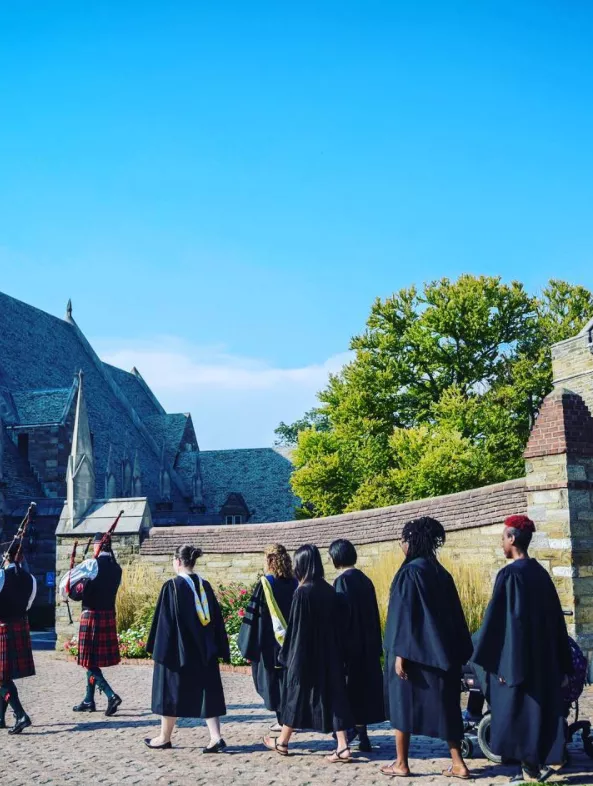
Tom Nailor, MSS student at the Graduate School of Social Work and Social Research, spoke at Bryn Mawr College's Convocation this week. His excellent remarks were well received by the entire Bryn Mawr Community and are available for viewing below.
From all of us at GSSWSR, thank you Tom!
Transcript:
Good afternoon President Cassidy, distinguished faculty, administration, and staff. And, of course, a warm welcome to new undergraduate and graduate students, as well as a warm welcome back to all of our returning students from all of us at the Graduate School of Social Work and Social Research. Today, we are beginning on a wonderful new journey in the pursuit of knowledge. And, in this pursuit, we can look to our Bryn Mawr College mascot, the owl, for inspiration. Owls, in many ways, exhibit the qualities one needs to succeed at Bryn Mawr, and in the world—a world that sorely needs what Bryn Mawr offers to its students. Just as we might admire alumnae like Katharine Hepburn or Carola Woerishoffer, we can also admire Hedwig, Harry Potter’s faithful avian ally, or Archimedes, familiar to the wizard Merlin. Why, you may ask, should we admire an owl? What might such a bird have to tell us about succeeding at Bryn Mawr? Far be it from me to ask for your blind faith.
Owls are well-known for three qualities, in particular—their hearing, their sight, and their flexibility. Today we shall leave aside their nocturnal nature, as such a quality is of obvious use to any well-meaning college student. We also leave behind the owl’s image as wise, knowing as we do that wisdom is something we grow in throughout our lives here at Bryn Mawr.
Owls have ears that are set asymmetrically on their skull. The difference in placement allows them to determine where a sound is coming from based on the time difference between that sound wave penetrating each ear. By turning their heads until it reaches both ears at the same time, an owl can know that it is facing in the right direction to follow the source of the sound—yet the difference can be as little as 30 millionths of a second between each ear! So too must a Bryn Mawr College student be ready to turn towards the source of knowledge, and to pursue it—whether it be a professor in the classroom, a friend, or someone we might rather not hear from. We must carefully listen for wisdom, ready for the minute differences in its source.
Owls, unlike many other nocturnal animals, do not use echolocation to guide them as they fly. Their impressively large eyes give them binocular vision, which allows for a wider field of view, a perception of both depth and distance, and the ability to detect the details of even a faint, faraway object. Still, owls are also known to be farsighted—they can, you might say, miss the trees for the forest. In fact, it is neural mechanisms that allow owls their impressive nocturnal vision—these neural mechanisms allow an owl to extract information effectively from the space around them, and to process it more quickly. Again, any Bryn Mawr student would do well to remember their binocular vision, to perceive the depth of a subject, the distance of their goals, and to adjust their plans accordingly. A Bryn Mawr student too must remember that their vision may be distorted—they may miss the small details of something close to home, and must be ready to look again as an owl might. A Bryn Mawr College student must be able to extract information quickly, dealing with it as necessary.
Finally, we come to the owl’s ability to turn its head—what can feel like a scene from The Exorcist when we see it! An owl must turn its head because of its limited visual field, and can rotate up to 270 degrees in either direction. So, what do all of us have to learn, as Bryn Mawr College students, from the owl? We must adapt, and we must be able to see things from new perspectives. We may surprise ourselves, just as the owl surprises us when turning its head in such a way, but this ability to avoid tunnel vision—to avoid looking in the same direction we always have—is something we all learn at Bryn Mawr. Sometimes we may feel that such twisting is an overextension, that it is impossible. But again, we look to the noble owl as our example, as we prepare to overextend ourselves.
In his poem “An Owl,” David Bottoms tells how the titular bird “turning his genius to the riddle/of the wire,” is able to try his best, even as he might fail—just as all of us must at Bryn Mawr, turn our genius to the riddles we come against. For our world sorely needs what Bryn Mawr College prepares us to do—to hear what might not be heard, to see what might not be seen, and to always be turning in new directions. I wish all of us the best in the upcoming academic year, and beyond.
Thank you.